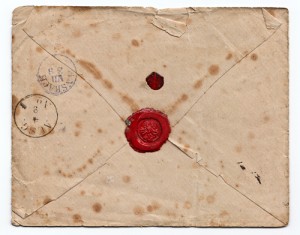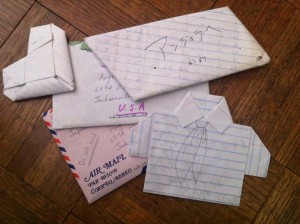 There is nothing so compelling as an old letter. My family has had in its possession a letter from Czechoslovakia to my great grandmother long after she immigrated to the U.S. The letter carries the news of the birth of the author’s son. My brother and sister have been traveling in Slovakia this week doing family research, and a couple days ago, they met the son of the author of that letter – the one whose birth had been mentioned.
There is nothing so compelling as an old letter. My family has had in its possession a letter from Czechoslovakia to my great grandmother long after she immigrated to the U.S. The letter carries the news of the birth of the author’s son. My brother and sister have been traveling in Slovakia this week doing family research, and a couple days ago, they met the son of the author of that letter – the one whose birth had been mentioned.
Letters have been showing up elsewhere in my life, too.
A couple of weeks ago, I was sifting through boxes of old memorabilia buried under my childhood bed and inhaling an unhealthy amount of dust in the process. It was a long-overdue task considering I left home eighteen years ago.
 I found birthday cards and notes from my friends for my 10th, 13th, and 16th birthdays. There were stacks of letters from my mom written while I was at camp, and letters from camp friends as we kept in touch during the school year. There were letters from several relatives, especially my grandmothers, and letters from my hometown friends once I went off to college. There was a stack of correspondence that spanned about ten years from one of my oldest friends as she made her way through various music camps, schools and other travel. Then there was an entire box of notes delicately folded like origami from one of my Japanese friends – all with her name (and often mine too) written in both English and Japanese characters. We used to slip notes through the slats in each other’s lockers.
I found birthday cards and notes from my friends for my 10th, 13th, and 16th birthdays. There were stacks of letters from my mom written while I was at camp, and letters from camp friends as we kept in touch during the school year. There were letters from several relatives, especially my grandmothers, and letters from my hometown friends once I went off to college. There was a stack of correspondence that spanned about ten years from one of my oldest friends as she made her way through various music camps, schools and other travel. Then there was an entire box of notes delicately folded like origami from one of my Japanese friends – all with her name (and often mine too) written in both English and Japanese characters. We used to slip notes through the slats in each other’s lockers.
I also found a box of my college papers, and had to stop to read one entitled “Old World Society” written for my freshman English class. As I read, I eventually remembered that I wrote it as a riff on Aldous Huxley’s Brave New World. It was a story set in Tallahassee, Florida (where I was in school) but in the era of the Huxley’s novel. The Florida State Seminoles were (cheesy, I know) the Somanoles, soma being the drug of choice in Brave New World. The protagonist was a young woman who was a member of something called the Old World Society, a group that secretly met to remember and celebrate the old ways of life. She listened to Strauss and read Shakespeare. Most important to her were the long-forgotten treasures of the past and the rich inner life they represented.
As I was trying to remember all the details of Brave New World and figure out what part of my story was was mine and what was Huxley’s, I came across a comparison of Orwell’s Nineteen Eighty-four to Huxley’s Brave New World. It was written by Neil Postman in the forward of his book Amusing Ourselves to Death:
What Orwell feared were those who would ban books. What Huxley feared was that there would be no reason to ban a book, for there would be no one who wanted to read one. Orwell feared those who would deprive us of information. Huxley feared those who would give us so much that we would be reduced to passivity and egotism. Orwell feared that the truth would be concealed from us. Huxley feared the truth would be drowned in a sea of irrelevance. Orwell feared we would become a captive culture. Huxley feared we would become a trivial culture, preoccupied with some equivalent of the feelies, the orgy porgy, and the centrifugal bumblepuppy. As Huxley remarked in Brave New World Revisited, the civil libertarians and rationalists who are ever on the alert to oppose tyranny “failed to take into account man’s almost infinite appetite for distractions.” In 1984, Huxley added, people are controlled by inflicting pain. In Brave New World, they are controlled by inflicting pleasure. In short, Orwell feared that what we hate will ruin us. Huxley feared that what we love will ruin us.
Apathy. Irrelevance. Distraction. Passivity.
If you take Postman’s assessment of Orwell and Huxley at face value, are we not already living out Huxley’s fears? In an age of social media, a constant flow of information and endless choice, I feel like these are some of our society’s, and my own, most important struggles. How do we keep our inner lives rich and vibrant? How do we keep our relationships real and meaningful? How do we feel engaged and truly connected to our communities (and not in a Facebook kind of way…)? How can we make sure we go deeply into life rather than just skimming over and satisfying ourselves moment to moment?
Fortunately I had the piles of letters I was keeping as a reminder. So I wrote a letter – okay, it was an email – to my friend whose correspondence spanned a decade. She is still one of my closest friends. Turns out that we shared the same feeling that, though technology is supposed to make us all more connected, it was not having that effect on us these days. So we’re continuing to write when we can.
No one can turn the clock back on technology – it seems it’s here to stay and is permeating every facet of our lives faster than ever. (Was anyone else freaked out by the New Yorker article “O.K., Glass”? Or the New York Times article “Leave No Child Untableted”?) It makes me sad that future generations are less likely to have the delight of carefully peeling open a yellowed envelope, or opening their lockers to find an exquisitely folded note from a friend.
Of course, for me, this is not just about letters and reading books, but touches on current issues of the music world. I worry that a society so accustomed to screens, instantaneous feedback, and information overload will not have the patience for anything like going to hear a Mahler symphony or going through the long process of learning to play an instrument masterfully.
There are those out there trying to make music more accessible to the masses by adding screens, or doing themed top-forty style concerts, or attempting to make it more “exciting” in one way or another. I suppose I can’t blame them for trying everything possible to keep classical music viable and in the public eye, literally. I just don’t think that compromising what we do is the answer (not to mention severely underutilizing the talent onstage, but that’s another post).
I feel like a percentage of the population will love music and will value it, especially if it’s not watered down, because it gives them something that they simply can’t get anywhere else in our screen-heavy, information-saturated, distraction-filled world. Why reduce the experience for them when the focus should be on presenting our beautiful treasures in such a way that they can be experienced thoroughly?
I have to say, I share Huxley’s fears – not for the year 2540, but for today. For me, I’ve been feeling like the answer is keep an eye out for the tendency to allow technology to weaken my relationships rather than strengthen them. To truly be involved with friends and the community, and to go on playing and teaching music, encouraging my students to enjoy the process of learning a challenging instrument and helping them to see the pleasure of exploring an art that, like an old letter, connects us, not only to our past, but to each other.
Old World Society, anyone?
